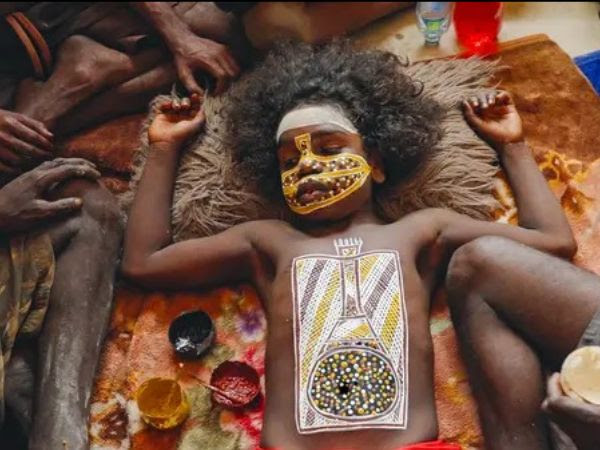As the credits rolled on Journey Home, David Gulpilil, I felt a deep sense of gratitude.
I am grateful that even in death, David Gulpilil remains true to his lifelong dedication to Aboriginal culture.
I am also grateful to his family and community, for allowing us to be a part of what would normally be a private period of mourning for their beloved elder. They don’t just allow us into their community, but they grace us with one on one interviews, that serve as explainers throughout the movie.
This generosity in the face of grief has presented us with a true gift. Journey Home serves as both a tribute to the late actor and an ethnography of funeral rites of the Yolŋu of Northern Territory.

Gulpilil wanted to introduce audiences to his remote home of Gupulul in North East Arnhem Land. The untouched beauty of Gupulul makes you understand why Gulpilil was so proud of the region.
However, the isolation is in no way romanticised. To give you an idea, you won’t find Gupulul on Google Maps. The only reference I could find of Gupulul was in maps in the movie and Mapcarta.
Indeed, a major arc of the documentary centres around the near impossible mission to to transport Gulpilil’s body.
If distance was not enough, there are physical barriers thwart Gulpilil’s final journey. The sacred watering hole that would be central in Gulpilil’s rites is located in swamp land.
A snaking river cuts Gupulul off from the region – the only time people can access the land via car is during low tides. However, the wet season threw a spanner in the works, flooding the area. This resulted in a months long delay in carrying out Gulpilil’s final rites.
However, after an arduous expedition via planes, helicopters and tinny boat rides, Gulpilil finally makes it home. I silently cheered as I was convinced that the obstacles would force his family to compromise on his final wishes.
We are privileged to witness ceremonies and customs that even Gulpilil’s people are unfamiliar with throughout the movie. Perhaps it is a testament to Gulpilil’s magnitude, that people from the far reaches of his home nation felt compelled to participate in his funeral.
So if you consider yourself a connoisseur of Australian film, Journey Home is essential viewing.
While it isn’t an in-depth biography of the screen legend, it honours the spirit of a man who had great pride for his nation. Consider it his final act of service to the Yolŋu people.
Journey Home is a platform that reminds us all that no matter how we express it, grief is universal. As Gulpilil would put it, we are “one red blood”.
Journey Home, David Gulpilil opens in cinemas 30th October.
